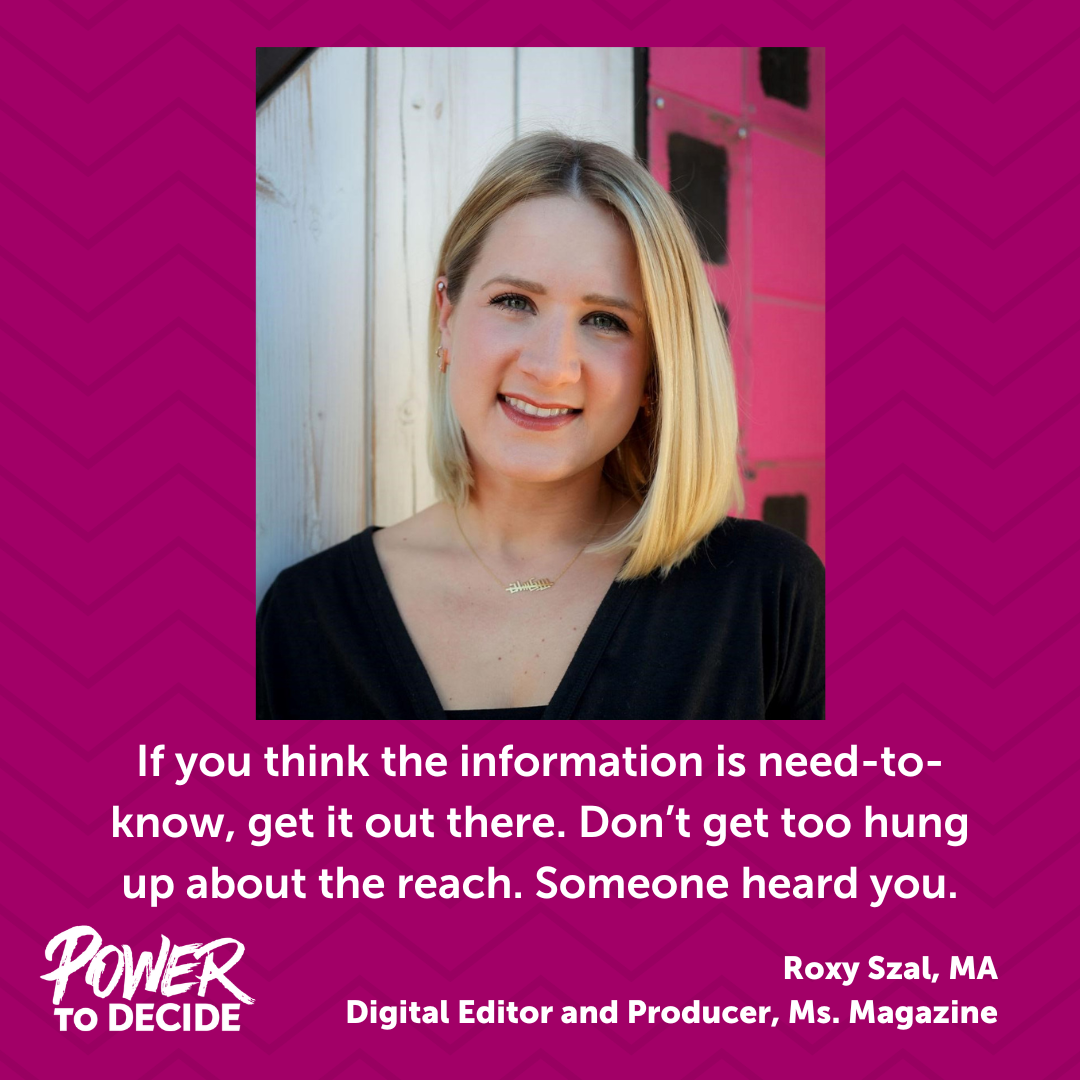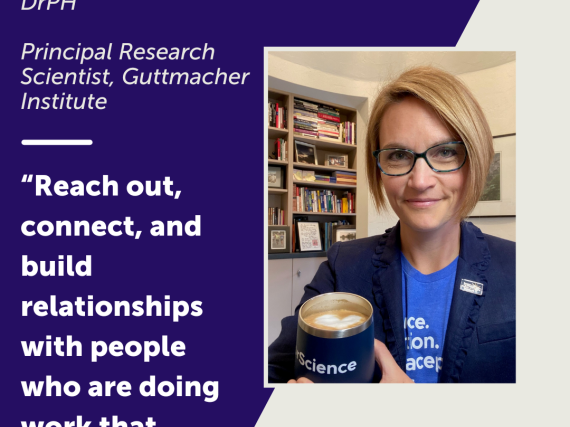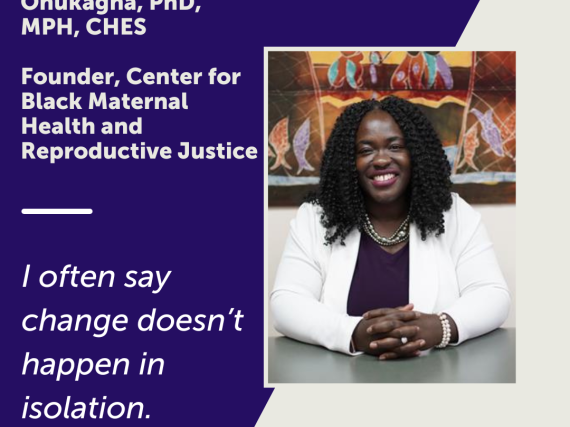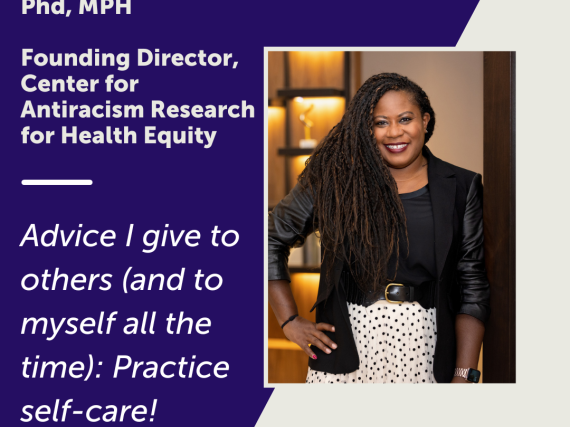September 2022 Power Player
At Power to Decide, we’re committed to uplifting the many individuals on the ground doing the work that matters most. Each month we highlight an individual who is championing the effort to support young people’s reproductive well-being. Check out this month's Power Player profile.
Roxy Szal, MA, (she/her)
Digital Editor and Producer on “On the Issues with Michele Goodwin” podcast, Ms. Magazine
What work have you done to ensure that all people have the information and access they need to make decisions that align with their intentions and improve their reproductive well-being?
I’m the digital editor at Ms., which ultimately means I’m the gatekeeper—along with Ms. executive editor Kathy Spillar—as to the kinds of information, news and voices we are lifting up on MsMagazine.com. I take this role very seriously.
When considering a story pitch for the website, I consider many questions, including:
- Will this story meet the needs of those directly impacted by injustice? In other words, who is this story for? Which audience will it best serve? Is it based on the experiences and identities of oppressed people?
- Will this story force a reckoning, or reveal new and needed information—especially on a topic that’s been previously underreported or badly reported?
I also practice movement journalism, which involves challenging the status quo and centers reporting around those most impacted by a story, rather than those causing the story. For example, when it comes to reproductive justice stories, traditional journalism would likely center and quote the lawmakers who are creating the harmful laws, like Texas’s S.B. 8. Movement journalism, however, would focus on those most impacted by a six-week abortion ban or the overturning of Roe this summer—like college students, low-income and rural Texans, women of color, trans and nonbinary people, and more.
Movement journalism also requires (among other things) “doing away with the myth of objectivity.” For example, abortion is healthcare. Period. Full stop. So when I’m writing or publishing a story on reproductive healthcare, I don’t find it to be my job to include voices of those who do not believe abortion is a life-saving revolutionary technology. If I were to include this voice, who does this serve?
In a dark period like we are currently in, in addition to centering those most impacted by abuses and restrictions, it’s also important I remember to highlight success stories about feminist ideas and strategies, activism and the great work feminists (women and men!) are doing at all levels to improve access and move the movement along.
Ensuring that all people have the information and access they need to make decisions that align with their intentions and improve their reproductive well-being also means packaging information in multiple ways. As the digital editor of a news site, the medium I work with most is text (op-eds and reported pieces), but I also think about how to repackage information in multiple ways so that it’s reaching the largest audience possible—whether that’s social media posts, email newsletters, video content, partner campaigns, a companion piece in Ms.’s print issue and more.
Though my heart is in the written word, I have no preference for how people get the information they need—as long as they get it!
How did you get started in your field? What is your driving force?
I consider myself a feminist journalist but putting those two words together was a journey.
I was raised by a two incredibly strong woman (my mom Lisa Szal and my grandma Bernie DeSimone) who showed me the power of women’s leadership. But my feminism was formally awoken in college, where I was able to learn more about the canon of feminist theory and see feminism in practice.
As for journalism, I came to it through a backdoor. I was a Texas public school teacher for four years, where I taught reading, writing, and blogging. I loved working with words and coaching others on how to express themselves, then how to hone and repackage those ideas and stories to maximize effect and reach. I just realized I wanted to work with adults. So I decided to pivot careers from education to journalism. I got my master’s degree remotely with the University of Nebraska-Lincoln, freelanced for a while, then landed an internship at Ms., which eventually turned into my current role.
What advice would you give to someone looking to effect change in the field that you currently work in?
Don’t get hung up on pageviews or reach of a story or post. I am obsessed with data and tracking audience engagement, but I have to remind myself it’s not everything. Most Ms. stories reach thousands of people. But if a particular story about how to access medication abortion, for example, only gets 500 pageviews, it’s easy to think the story didn’t land. But who knows exactly who or where those 500 people who read the story are—whether it’s people on the ground who could use the information to improve their daily lives or opinion leaders, thought leaders, policymakers, movement leaders, grassroots activists and other influentials. And more importantly, what power did that information equip them with that they didn’t already have?
TL;DR: If you think the information is need-to-know, get it out there. Don’t get too hung up about the reach. Someone heard you.
Why should someone care about ensuring that all people—regardless of who they are or where they live—have the information and access they need to live their best life?
Access to reproductive healthcare is power. And in a country like the US, with the worst maternal mortality rate among developed nations (and even worse for women of color), reproductive justice is a matter of life and death.
But even if someone carries a baby to term and survives, it doesn’t change the fact that reproductive choice is FREEDOM. Providing true access to a full range of reproductive health options—whether it’s abortion care, high-quality maternal care, contraceptive access or anything in between—is good for the economy and the financial security of women and families.
Is there a highlight of your work in conjunction with our organization that you’d like to share?
I’m so proud of the work Power to Decide and Ms. do to produce our Power Talks, quarterly discussions featuring leaders in the sexual and reproductive health field. I moderate these incredible discussions, which have featured repro powerhouses like: Dr. Jennifer Lincoln, who runs a virtual sex ed class for her almost 2 million followers on TikTok; Dr. Megan Stubbs, sexologist and relationship expert; Dr. Staci Tanouye, board-certified gynecologist physician and a women’s health blogger; Vanessa Geffrard, the founder of VagEsteem; Jennifer Driver, senior director of reproductive rights at State Innovation Exchange (SiX); and many more.



